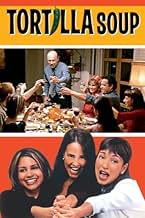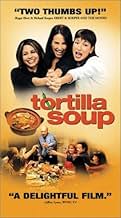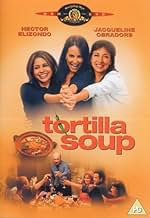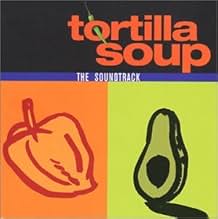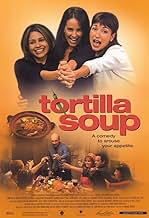IMDb-BEWERTUNG
6,7/10
5456
IHRE BEWERTUNG
Füge eine Handlung in deiner Sprache hinzuA Mexican-American master chef and father to three daughters has lost his taste for food, but not for life.A Mexican-American master chef and father to three daughters has lost his taste for food, but not for life.A Mexican-American master chef and father to three daughters has lost his taste for food, but not for life.
- Auszeichnungen
- 2 Gewinne & 7 Nominierungen insgesamt
Jude Herrera
- Eden
- (as a different name)
Empfohlene Bewertungen
Better than the ordinary Hollywood movie, this family comedy does a very nice job of presenting a variety of characters in the throes of pursuing their own version of the American Dream. That the family is Mexican-American adds a welcome difference. The camera loves the food being prepared, the Latin-flavored music score enlivens the proceedings, and the acting is quite serviceable. Jacqueline Obrador and Elizabeth Pena shine as the older daughters in the family, the always-reliable Hector Elizondo is fine in a rare leading role. Of greatest interest, however, may be Raquel Welch, playing her age and her ethnicity for the first time in my memory. It is her role, not her performance, that mars the movie. She is a caricature of an older-middle-aged unattached woman, the butt of unkind jokes. And it is the unwitting bias toward the older woman character that undermines the otherwise upbeat, happy ending intended. Still, this one's worth the cost of a rental. Not great art but at least it doesn't insult the viewers' intelligence.
My wife and I thoroughly enjoyed this film. We had wanted to see this when it first came to video/DVD but didn't get to it. Frankly, I then forgot about it. Last week, I was reminded of the movie and went out and rented it.
I have not seen the Ang Lee movie, "Eat, Drink, Man, Woman" so can not comment on how it compares. But we really liked "Tortilla Soup" The performance by the cast of Elizondo, Pena, Obradors and unknown (to me) Mello; was very good. Raquel Welch was a bit over the top, but all in good fun. The interaction between the father (Elizondo) and daughters was believable and you could sense the love he had for them under his stern exterior (and you knew his daughters knew it too).
As others have mentioned, the food preparation and serving scenes were colorful and very beautiful. Shows there is a lot more to Mexican cuisine than what you run into at most restaurants.
This movie will make you smile, like enjoying a good meal. 8 out of 10
I have not seen the Ang Lee movie, "Eat, Drink, Man, Woman" so can not comment on how it compares. But we really liked "Tortilla Soup" The performance by the cast of Elizondo, Pena, Obradors and unknown (to me) Mello; was very good. Raquel Welch was a bit over the top, but all in good fun. The interaction between the father (Elizondo) and daughters was believable and you could sense the love he had for them under his stern exterior (and you knew his daughters knew it too).
As others have mentioned, the food preparation and serving scenes were colorful and very beautiful. Shows there is a lot more to Mexican cuisine than what you run into at most restaurants.
This movie will make you smile, like enjoying a good meal. 8 out of 10
This is an exact almost word for word copy of Eat Drink Man Woman, a 1994 Twainese production. Both movies are great, but Tortilla soup looses points for lack of originality.
Both movies offer sharp portrayals of their various cuisines, and your preference may be Mexican vs.Chinese, however if you can tolerate the fast pace Chinese dialog (subtitles), see the original first. I also preferred the scenery of the original (Eat Drink Man Woman), but perhaps that is because Taiwan is the orient and the architecture is spectacular.
Finally, both movies are well acted although the lifestyle portrayed in the story line may be somewhat more believable in the Southern California setting of Tortilla Soup.
Both movies offer sharp portrayals of their various cuisines, and your preference may be Mexican vs.Chinese, however if you can tolerate the fast pace Chinese dialog (subtitles), see the original first. I also preferred the scenery of the original (Eat Drink Man Woman), but perhaps that is because Taiwan is the orient and the architecture is spectacular.
Finally, both movies are well acted although the lifestyle portrayed in the story line may be somewhat more believable in the Southern California setting of Tortilla Soup.
Tortilla soup is all about family and food (dinner) and how each really draws inspiration from the other. The food is the hub from which the drama, and the laughs, turn.
Three daughters, each at different phases of their lives, are torn between their home lives ruled by their stern but loving father and the outside world. Dad, a chef, spoils them with some of the best nuevo spanish cuisine any latina daughter could ever possibly hope for, and has instilled in each an appreciation of food, and life. Dad is single, realizes he is about to lose the core of his family one by one and food is all he has, or so he thinks. Just when you think he'll be alone to cook for himself, surprises come in spades. And, as always, it's the food that draws them all back.
Three daughters, each at different phases of their lives, are torn between their home lives ruled by their stern but loving father and the outside world. Dad, a chef, spoils them with some of the best nuevo spanish cuisine any latina daughter could ever possibly hope for, and has instilled in each an appreciation of food, and life. Dad is single, realizes he is about to lose the core of his family one by one and food is all he has, or so he thinks. Just when you think he'll be alone to cook for himself, surprises come in spades. And, as always, it's the food that draws them all back.
You've got to wonder about a film that pitches its food as the star. Not that the dishes, prepared by the `Too Hot Tamales' Mary Sue Milliken and Susan Feniger, fall short of expectations. Tortilla Soup is rife with cooking and dinner scenes that feature both classic Mexican and Mexican fusion dishes. But nobody eats film, so the magnitude of the food's presen ce distracts from the story line. Or maybe the story line distracts from the story line.
Lying beneath it all, is a story about a family of Mexican-Americans and their abruptly changing lives. Hector Elizondo (Chicago Hope) is Martin Naranjo, a semi-retired chef and the father of three young women. Every Sunday his three daughters are required to join him for a grand meal, which he spends the day preparing. His eldest daughter Leticia, played by Elizabeth Pena, is a devout Christian and a schoolteacher. She's the daddy's girl. The middle child Carmen (Jacqueline Obradors) is a successful executive, with an eccentric style of cooking that aggravates her father. The youngest daughter Maribel (Tamara Mello, She's All That) is a fun loving high school student that longs to see the world. Soon Leticia starts receiving love letters, Carmen gets offered a job in Barcelona, and Maribel decides to run off with her new boyfriend. Nothing is as it once was. People begin to miss Sunday dinner, which aggravates Martin, whose taste is dead and health may be failing. Martin decides to fill his new free time with the courtship of the mother of a family friend. Hortensia (Raquel Welch) seeks Martin as her fourth husband.
The dining scenes are extensive, acting as segues into the major conversations in the film. The cooking scenes battle the dialogue for time on the screen. The soundtrack, most audible when food is either being prepared or being eaten, turns out to be the hidden star of Tortilla Soup. It's light Latino fare, showcasing `Si En Un Final' by Eliades Ochoa of the Buena Vista Social Club and a Spanglish version of `Perhaps, Perhaps, Perhaps,' by Lila Downs. It's a warm fuzzy moment when the girls sing a song together during post-dinner KP duty. That's what sisterhood is all about. It's about the love, the support, and the cleaning.
Everything seems to work out for the characters, as they often do in movies. I'm not going to give anything away, but I will say that it involves both `living happily' and `forever after.' There's a twist, which the written documents sponsored by the film all boast as unpredictable, and this can be attributed to its lack of support throughout the film. The cast, despite a high level of talent, fails to perk up dialogue that teeters on the edge of cheesy. In one scene, Leticia and Carmen discuss their father's disdain for Christianity. Martin, a Catholic, feels that Christians worship Christ, rather than Christianity as a whole. Carmen mentions that Christ was a Christian, and both girls are surprised when the hairdresser reminds them that Christ was a Jew. Wouldn't the `devout' Leticia have known that?
One of the more tactfully placed cultural snippets is the persistent use of Spanglish, the Spanish/English hybrid, which Martin shuns. His demands for either English or Spanish to be spoken in his household serves the character well, reinforcing the juxtaposition of Martin's loyalty to tradition and his Americanization of the daughters. A great deal of Tortilla Soup seeks to enrich the audience with factual knowledge about Hispanic culture and religion, but most of it is presented it so conspicuously as to make it appear forced and excessive.
The film's saving grace is the relationships between the characters. While the characters as individuals are peppered with stereotyping, the entire Naranjo family and their friends blend together nicely. Through thick and thin, sisters are sisters, and offer each other unwavering support. Their father, who struggles with his own faults, seeks to find the line between helping and suffocating his children. As his family changes, so must he, and for a man seeped in tradition, change comes slowly. Martin is aided through this transition by the hand of a young girl, a daughter of a friend, whom he visits at school daily to bring a home cooked lunch. The young girl quells Martin's empty nest syndrome and also plays a roll in the `surprise' ending. And that's the best hint you'll get the whole movie.
It's difficult to say whom Tortilla Soup was written for. It's rated PG-13 for sexual content, but it leans toward PG. It's really a family movie, a daytime matinee. Maybe something to do in the afternoon before having a nice sociable dinner. Then again, the food in the film looks so good, dinner will probably be a disappointment. Directed by Maria Ripoll. 102 Min. Rated PG-13.
Lying beneath it all, is a story about a family of Mexican-Americans and their abruptly changing lives. Hector Elizondo (Chicago Hope) is Martin Naranjo, a semi-retired chef and the father of three young women. Every Sunday his three daughters are required to join him for a grand meal, which he spends the day preparing. His eldest daughter Leticia, played by Elizabeth Pena, is a devout Christian and a schoolteacher. She's the daddy's girl. The middle child Carmen (Jacqueline Obradors) is a successful executive, with an eccentric style of cooking that aggravates her father. The youngest daughter Maribel (Tamara Mello, She's All That) is a fun loving high school student that longs to see the world. Soon Leticia starts receiving love letters, Carmen gets offered a job in Barcelona, and Maribel decides to run off with her new boyfriend. Nothing is as it once was. People begin to miss Sunday dinner, which aggravates Martin, whose taste is dead and health may be failing. Martin decides to fill his new free time with the courtship of the mother of a family friend. Hortensia (Raquel Welch) seeks Martin as her fourth husband.
The dining scenes are extensive, acting as segues into the major conversations in the film. The cooking scenes battle the dialogue for time on the screen. The soundtrack, most audible when food is either being prepared or being eaten, turns out to be the hidden star of Tortilla Soup. It's light Latino fare, showcasing `Si En Un Final' by Eliades Ochoa of the Buena Vista Social Club and a Spanglish version of `Perhaps, Perhaps, Perhaps,' by Lila Downs. It's a warm fuzzy moment when the girls sing a song together during post-dinner KP duty. That's what sisterhood is all about. It's about the love, the support, and the cleaning.
Everything seems to work out for the characters, as they often do in movies. I'm not going to give anything away, but I will say that it involves both `living happily' and `forever after.' There's a twist, which the written documents sponsored by the film all boast as unpredictable, and this can be attributed to its lack of support throughout the film. The cast, despite a high level of talent, fails to perk up dialogue that teeters on the edge of cheesy. In one scene, Leticia and Carmen discuss their father's disdain for Christianity. Martin, a Catholic, feels that Christians worship Christ, rather than Christianity as a whole. Carmen mentions that Christ was a Christian, and both girls are surprised when the hairdresser reminds them that Christ was a Jew. Wouldn't the `devout' Leticia have known that?
One of the more tactfully placed cultural snippets is the persistent use of Spanglish, the Spanish/English hybrid, which Martin shuns. His demands for either English or Spanish to be spoken in his household serves the character well, reinforcing the juxtaposition of Martin's loyalty to tradition and his Americanization of the daughters. A great deal of Tortilla Soup seeks to enrich the audience with factual knowledge about Hispanic culture and religion, but most of it is presented it so conspicuously as to make it appear forced and excessive.
The film's saving grace is the relationships between the characters. While the characters as individuals are peppered with stereotyping, the entire Naranjo family and their friends blend together nicely. Through thick and thin, sisters are sisters, and offer each other unwavering support. Their father, who struggles with his own faults, seeks to find the line between helping and suffocating his children. As his family changes, so must he, and for a man seeped in tradition, change comes slowly. Martin is aided through this transition by the hand of a young girl, a daughter of a friend, whom he visits at school daily to bring a home cooked lunch. The young girl quells Martin's empty nest syndrome and also plays a roll in the `surprise' ending. And that's the best hint you'll get the whole movie.
It's difficult to say whom Tortilla Soup was written for. It's rated PG-13 for sexual content, but it leans toward PG. It's really a family movie, a daytime matinee. Maybe something to do in the afternoon before having a nice sociable dinner. Then again, the food in the film looks so good, dinner will probably be a disappointment. Directed by Maria Ripoll. 102 Min. Rated PG-13.
Wusstest du schon
- WissenswertesThe plot of this movie is a Hispanic version of Eat Drink Man Woman (1994), about an aging widower chef who raised three daughters alone, both being written by Ang Lee. Even the opening crisis, the restaurant previously run by the chef has ruined the main feature of a huge banquet and he is called in to save the day, is the same.
- PatzerAt the end when Carmen is leaving the kitchen to serve her family, at first she has one plate without the lobster, then when she is leaving the kitchen, as she is turning the corner, she has the plate with a lobster. Then, coming out of the kitchen, the lobster has disappeared, then reappears again when she turns towards the tables.
- Zitate
Carmen Naranjo: Do you know why we clink glasses before drinking?... It's so that all the five senses are involved. We touch the glass. We smell the drink. We see its color. We taste it. Hearing is the only sense that doesn't participate unless we create it.
Top-Auswahl
Melde dich zum Bewerten an und greife auf die Watchlist für personalisierte Empfehlungen zu.
- How long is Tortilla Soup?Powered by Alexa
Details
- Erscheinungsdatum
- Herkunftsland
- Offizieller Standort
- Sprachen
- Auch bekannt als
- Cocinando La Vida
- Drehorte
- Marshall Fundamental Secondary School - 990 Allen Avenue, Pasadena, Kalifornien, USA(School where Leticia Naranjo teaches)
- Produktionsfirmen
- Weitere beteiligte Unternehmen bei IMDbPro anzeigen
Box Office
- Bruttoertrag in den USA und Kanada
- 4.467.615 $
- Eröffnungswochenende in den USA und in Kanada
- 653.729 $
- 26. Aug. 2001
- Weltweiter Bruttoertrag
- 4.634.077 $
Zu dieser Seite beitragen
Bearbeitung vorschlagen oder fehlenden Inhalt hinzufügen

Oberste Lücke
By what name was Tortilla Soup - Die Würze des Lebens (2001) officially released in India in English?
Antwort







